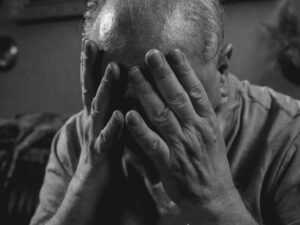- Empty cart.
- Continue Shopping
How to Cope with Post-Traumatic Stress Disorder (PTSD)

Post-Traumatic Stress Disorder (PTSD) is a mental health condition that can develop after a person experiences a traumatic event or series of events. It can have a profound impact on a person’s life, affecting their mental, emotional, and physical well-being. Coping with PTSD is a challenging journey, but there are effective strategies and treatments available to help individuals manage their symptoms and regain a sense of control.
1. Seek Professional Help
Reaching out to a mental health professional is often the first and most crucial step in coping with PTSD. A qualified therapist or counselor can provide a safe and supportive environment for you to explore your thoughts and feelings. They can offer evidence-based treatments such as cognitive-behavioral therapy (CBT), exposure therapy, and eye movement desensitization and reprocessing (EMDR) to help you process and manage traumatic memories.
2. Educate Yourself
Understanding PTSD is empowering. Learning about the condition, its symptoms, and its treatment options can help you make informed decisions about your care. There are many reputable resources, books, and websites dedicated to PTSD that can provide valuable information and insights.
3. Build a Support System
Connecting with supportive friends and family members can make a significant difference in coping with PTSD. Share your experiences and feelings with trusted individuals who can provide emotional support and understanding. Support groups for trauma survivors can also be beneficial, as they offer a sense of belonging and the opportunity to learn from others who have faced similar challenges.
4. Practice Self-Care
Taking care of your physical and emotional well-being is essential when coping with PTSD. Here are some self-care strategies to consider:
- Maintain a Healthy Lifestyle: Eat a balanced diet, engage in regular physical activity, and prioritize sleep. A healthy body can better cope with stress.
- Relaxation Techniques: Practice relaxation techniques such as deep breathing, mindfulness meditation, or yoga to reduce anxiety and stress.
- Avoid Substance Abuse: Avoid using alcohol or drugs to cope with PTSD symptoms, as they can worsen the condition and lead to dependency.
5. Create a Routine
Establishing a daily routine can provide structure and stability in your life, which can be particularly helpful when dealing with PTSD. Predictability and consistency can reduce anxiety and create a sense of control.
6. Manage Triggers
Identify and manage triggers that may worsen your PTSD symptoms. Triggers can be situations, places, or people that remind you of the traumatic event. Avoidance is not always the best strategy, so working with a therapist can help you learn how to confront and manage these triggers effectively.
7. Practice Grounding Techniques
Grounding techniques can help you stay connected to the present moment and manage overwhelming emotions. Techniques may include focusing on your senses (sight, sound, touch, taste, and smell), using calming affirmations, or holding an object that provides comfort.
8. Set Realistic Goals
Setting achievable goals, no matter how small, can boost your sense of accomplishment and self-esteem. Celebrate your successes along the way, and be patient with yourself as you work through your healing process.
9. Consider Medication
In some cases, medication may be recommended to manage PTSD symptoms, particularly if you are struggling with severe anxiety, depression, or insomnia. A mental health professional can discuss the benefits and risks of medication with you.
10. Be Patient with Yourself
Recovery from PTSD is not linear, and healing takes time. Be patient with yourself and acknowledge that there may be setbacks along the way. Celebrate your progress and focus on the steps you can take to move forward.
Finally, Coping with PTSD is a deeply personal journey, and what works best for one person may not work for another. It’s essential to find a combination of strategies and treatments that suit your unique needs and circumstances. Remember that you don’t have to face PTSD alone, and seeking professional help is a critical step toward healing and recovery. With time, support, and determination, many individuals can learn to manage their symptoms and regain control over their lives.








